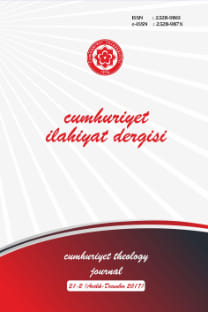KİTAB-I MUKADDES VE KUR' AN ÇERÇEVESiNDE RAYANIN EVRENSELLİGİ: UTANMADIKTAN SONRA İSTEDİGİNİ YAP
Haya duygusu kişi üzerinde bir kontrol mekanizması kurmakta; onu toplum değerlerinin karşısında olmamaya zorlamaktadır. Haya, sosyal yaptırıma sahip psiko-sosyal bir güçtür. Sosyal bir var/tk olan insanın öteki ile Insanca yaşayabilmesi için esas alacağı sosyal, psikolojik ve ahlaki bir ölçüdür. İslam evrensel bir din olup Hz. Muhammed (s.a.v.) de bütün insanlığa gönderilmiş bir peygamberdir. Hadisler O'nun sözü olunca, bazı hadislerin de evrensel özellikler taşıması doğaldır. Peygamberlerin mesajları büyük ölçüde süreklilik ifade eder. İlk peygamberden son peygambere kadar bütün peygamberlerin üzerinde durdukları ve bu yüzden insanların aklında kalan ilkelerden biri de Utanmadtktan sonra dilediğini yap sözüdür. Bütün peygamberler, görevli oldukla·n coğrafyada, insanlan haya çizgisine çekmeye çalışmışlardır. Bu makalede, Kitab-ı Mukaddes ve Kur'an çerçevesinde, haya duygusunun evrenselliğin! ele alacağız.
Universality of Shame in the Holy Bible and the Koran: If You Feel No Shame1 Then Do As You Wish
Feeling of shame cons~itues a control mechanism over indlvldual and a society and forces individual not to be against the values of societ:Y. Shame isa psyc-· hocial power which has a social compelling force. It is a social, psychosocial and moral creteria for a social being human to llve whit the nother'in a manner, which suits the humanity. Islam is a universal religion, Muhammad (peace be open him) who is the last prophet sent a messenger to all humanity. As the hadisths are the word belong to him sait is very natural that the hadisths carry an universal features. To a greater extent propets' messages express contlnuity. From the very fırst prophet to the last prophet all the prophets emphizes on one of the prinsipalswhich was for this reasen kept in the minds of human: if ya feel no shame; do whatever you want. All the prophets tried to bring the people to the modesty in their geography in which they have a mission. In this article, we're going to deaf wfth universafity of the shame feellng .ın a framework of the Hoiy Book and Quran.
___
- Abdurrezzak b. Hemmam, el-Musannef, thk., H. Rabman Azaınl, (I-XI), el Mektebu'l
- Ahmed b. HanbeL el-Müsned, Çağrı_ (I-VI), İstanbul, 1992.
- Ahmed Rif' at, Tasvir-i Ahlak, Dersaadet, 1309.
- Aşık, Nevzat, "Sünnetin Yerelliği ve Evrenselliği", (Sünnetin Dünü-Bugünü ve Geleceği
